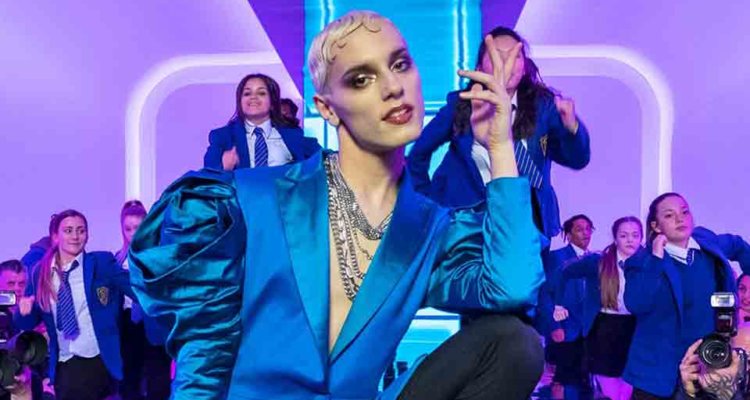Much of “Everybody’s Talking About Jamie” is like its aspiring drag queen protagonist (Max Harwood), torn between the anxious modesty of inexperience and the bombast bursting at the seams. It’s frankly not a bad place to start, as what fuels the film is a flavor of sincerity that inexplicably, and for better, I think, generally doesn’t work beyond its means and place its audience in a headlock of earnestness. Despite its flaws in translating a story two times over, it has an effervescent quality, an undeniable likability that appears to stem from director Jonathan Butterell (his feature debut) careful, but not overly calculated, choreographing of charm.
READ MORE: Fall 2021 Movie Preview: 60+ Must-See Films
Perhaps this is rooted in a tacit awareness of the story’s political potential. An adaptation of the 2017 musical of the same name (enormously successful on the West End) with music and lyrics by Dan Gillespie Sells (of The Feeling) and a book by Tom MacRae, which was itself loosely based on the BBC documentary “Jamie; Drag Queen at 16,” Butterell (who’s been with the show since its initial Sheffield production) frames Jamie and his divorced mother Margaret (Sarah Lancashire) often about their class. Margaret pulls double shifts to pay for the sweet and simple birthday party in the film, and we spy a shot of a little jar of money that’s savings for Jamie’s most desired pair of sparkling red pumps.
READ MORE: The Best Films Of 2021, So Far
That they bear a resemblance to another pair of shoes with transportative powers feels deliberate: while the idyllic hills and valleys of Sheffield are lovely in a bucolic sort of way, they cast Jamie out at sea, adrift and in search of, ahem, a place beyond the clouds. He scrolls Instagram, imagining himself, when asked about what kind of job he wants, in the buoyant opening number “And You Don’t Even Know It” as a showstopping, mythmaking queen with the slickest of aesthetics. (Other classmates hope to be influencers and YouTube stars.) Butterell gently transforms banal school environs in this number and others into a luridly lit club, an installation nightmare hallway, and dreamy, flash bulb-drowned runway. However, the fantasy here is an implication, not just of fame and influence, but of independence and economic upward mobility.
READ MORE: The 100 Most Anticipated Films Of 2021
In a coming-of-age film, or one about the fantasy of becoming another person or following your dreams or whatever, perhaps that framework of class ascension is not especially novel; “Jamie,” and screenwriter MacRae, seems to have an awareness of this. That it’s not really enough to just have Jamie have an ultimate dream to transcend his daddy issues and become a fabulous drag queen, but that the act of becoming a drag queen in and of itself is connected to a history and a lineage of social and political work, of queer activism.
When Jamie meets his fairy godmother in drag shop owner Loco Chanel, nee Hugo (Richard E. Grant), the film adds a number that not only enters another time and mode of filmmaking (it’s a VHS tape documenting the queen’s life in the early 1990s), but makes explicit the connection between coming out, becoming a drag queen, and political activism. In the a-Ha-esque number “This Was Me,” we see other LGBTQ people out on the street fighting for their rights, calling attention to a government that is abandoning them during the AIDS epidemic, clubs being raided by police, the footage grainy and glitchy. “Everybody’s Talking About Jamie” is, shall we say, brave enough to argue that pleasure and politics are inextricable.
It’s an impressive argument to make in a film that would otherwise be content with leaning into a more insular point of view, that Jamie’s dream to attend the prom in a dress is enough resistance on its own, and few films of this breed would be inclined to make the connection. “Over the Top,” too, casts drag queens as warriors, their painted faces ready for battle. From “Love, Simon” to “Alex Strangelove,” those queer and gay worlds are fairly compact, the notion that there’s a matrix of people, places, and events that have shaped what queerness is and how it looks, is seldom on those films’ minds. Admittedly, the film’s commitment to this direct consideration of queerness as a lineage wavers as the film goes on, but the number is absolute in how it wants to place Jamie in a broader context, even if the film isn’t completely successful in following that through the end.
This even mild awareness really underlines the film’s winning unassuming nature; it never leans too heavily in hyperactive MTV editing, instead finding a pleasant balance of coverage and theatrical imagination; and bleach-blond Harwood grows into the role in an open and unaffected way. Harwood’s portrayal of Jamie is not as an already birthed star crashing down to earth, but a sweet, excited, restless 16 year old, testing the limits of his aspirations in a space that can’t possibly accommodate them. It’s better that he’s not a conventional showstopper blasting everyone away; it’s kind of the point that he isn’t, that his own perceived brightness occasionally blinds him as a folly of youth. Instead, he’s very talented, feeling out each scene and each song, lending a humane and tender quality that’s grounded. The contrast and discrepancy are there, clear as day but sympathetically told: how do you live a fantasy — of being yourself and protecting your kind — in a real-world that won’t necessarily let you? Jamie’s solution: give them something to talk about. [B+]

